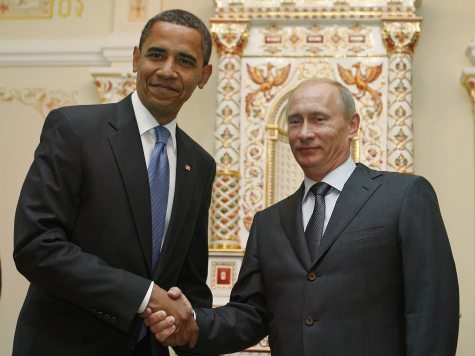
The United States will not limit its deployment plans to install a NATO missile shield against potential Iranian threats despite Friday’s threat of possible retaliation from Russian President Dmitry Medvedev, according to White House sources.
Russia’s president Dmitry Medvedev issued a stern warning Friday against Washington, threatening a possible retaliatory attack if NATO continues with its plans to install a missile defense shield to deflect future Iranian threats.
The missile plan would reportedly “break the nuclear parity” between the two superpowers, and the potential of a U.S.-Russia showdown could shatter the 2009 Obama-Medvedev plan known as the “reset” in which the two leaders agreed to try and improve the quality of relations between the United States and Russia.
“This is the same thing that Medvedev and Putin have been saying for months,” White House National Security Council Office spokeswoman Caitlyn Hayden told Breitbart News in a brief telephone interview Friday afternoon.
“We’ve been transparent with Russia on our plans for missile defense in Europe… we’ve been very clear that the system is not directed against Russia, and we’ve explained that it does not threaten Russia, and that it is not aimed at them.”
The Kremlin’s chief concern is that NATO has not yet guaranteed that the missiles will not be pointed at Russia, and contrary to what the White House tells Breitbart News, Russian officials say missiles are scheduled to be directed toward the former U.S.S.R.
Dmitry Rogozin, a deputy prime minister in charge of the military industries, declared in the same press conference with Medvedev that the NATO shield has an “openly anti-Russian vector… The system that is being developed is intended to intercept heavy intercontinental missiles blasting off from the Russian territory.”
On Friday, the Russian president issued a stern hawkish warning:
“I will say honestly that no matter how warm relations between me and my colleagues are, no matter how advanced relations between Russia and NATO member states are, we will have to take that into account and, under certain circumstances, respond,” Medvedev said Friday. “No one has explained to me why we should believe that the new missile defense system in Europe isn’t directed against us.”
The recent war of words between the White House and Medvedev demonstrate that tensions have apparently been rising beneath the stainless steel stars that rest atop the Kremlin, stirring up cold war sentiments reminiscent of the Cuban Missile Crisis when the Soviets threatened to arm Cuba with ICBMs.
Many historians speculate that the Soviets created the October 1962 Cuban Missile Crisis to pressure President John F. Kennedy to remove U.S. Jupiter missiles lining the border of Turkey.
Earlier this week, the Russian president ordered top military officials to prepare to counter U.S. missile defense plans even as talks between Moscow and Washington are continuing.
In a recent Voices of Russia radio interview, Rick Rozoff, managing editor of the Stop NATO website, argued that the ABM shield endangers Russia’s nuclear forces:
From its inception, Prompt Global Strike program is to include intercontinental ballistic missiles, which the U.S. states will be equipped with non-nuclear warheads, with conventional warheads… Russia has to be worried about is that more advanced interceptor missiles could follow the SM-3’s and thinking particularly of the Terminal High Altitude Area Defense, the acronym is THAAD, that can intercept not only short and medium, but intermediate range missiles…
White House spokeswoman Caitlyn Hayden concluded, “We feel that our cooperation with Russia on missile defense enhances the security of the United States and Russia as well as our allies in Europe, but we are not limiting any of our deployment plans.”
A Friday afternoon call to the public affairs office of the Russian Embassy in Washington, D.C. was not returned.

COMMENTS
Please let us know if you're having issues with commenting.